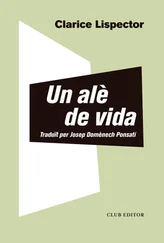For she had moments of distraction. Her face took on a smooth mask of impassive sadness. A sadness more ancient than her nature. Her eyes became vacant; one might even say a little cold. Anyone near her suffered without being able to help. All one could do was to wait.
For this strange infanta had succumbed to something. No one would dare to touch her at such a moment. One could only wait, solemnly watching over her with bated breath. All one could do was to hope that the danger might pass. Until with an unhurried gesture, almost like a sigh, she would awaken like a newborn fawn struggling to its feet. She had returned from her repose in sadness.
She was returning, perhaps no richer, but certainly more reassured after having drunk from who knows what fountain. But a fountain which must have been ancient and pure. Yes, she had hidden depths. Although nothing could be discovered simply by exploring those depths — profundity itself had to be explored, just as one discovers shadows in darkness. It is possible that if someone were to travel further, to cover leagues in the dark, they might find some trail, guided perhaps by the fluttering of wings, by an animal’s tracks. Then — all of a sudden — the forest.
So that was her mystery: she had discovered a short cut into the forest. That was almost certainly where she vanished in her moments of distraction. Only to return, her eyes filled with sweetness and ignorance. Her eyes brimming with tears. An ignorance so vast that it could absorb all the wisdom of this world.
That was Eremita. Had she surfaced with everything she found in the forest, she would have gone up in flames. But what she had seen — the roots she had bitten into, the thorns which had drawn blood, the water in which she had bathed her feet, the golden darkness which had enfolded her in its light — none of this she could describe: it had been seen at a glance, and in great haste. So the mystery remained intact.
When she emerged, she was a housemaid once more. Who was constantly being summoned from the darkness of that shortcut to more servile tasks — to wash clothes, to mop the floor, to serve this one and that one.
But was she really serving? For anyone looking closely would have noticed that she washed clothes in the sun; that she mopped the floor — drenched by the rain; that she hung the sheets — out in the wind. She took care to serve from a much greater distance, and to serve other gods. Always with that integrity she had brought from the forest. Without thinking: simply a body, quietly going about her chores, her face radiating a gentle hope which can neither be given nor taken away.
The only trace of the danger she had faced was her furtive way of eating bread. In everything else she remained serene. Even when she stole money which had been left lying on the table or slipped the odd parcel of food to her boyfriend. For she had also mastered the art of petty theft during her excursions into the forest.
I woke up in the middle of the night longing to possess a white dress. Made of the finest chiffon. My longing was intense and clear. I believe it was my perpetual innocence. I know that some people find me dangerous. They have even told me so to my face. But I am also innocent. The desire to dress in white has always been the thing that saved me. I know, and perhaps only I and a few others know, that if there is something dangerous about me, there is also something pure. And that purity is only dangerous for those who have danger inside them. The purity I speak of is transparent: one even accepts the bad things. And it has the same effect as that white chiffon dress. Perhaps I will never possess it, yet it is as if I possessed it already, because one learns to live with what is so sadly lacking. I also long for a black dress which will make me look fairer and accentuate my purity. Is this really purity? The primitive is pure. Spontaneity is pure. Is evil pure? I am not sure. What I do know for certain is that sometimes the root of evil is of an impossible purity.
I woke up in the middle of the night with such intense longing for a white chiffon dress, that I got up and looked in my wardrobe. I found one white dress in thick material with a round neckline. Is thickness purity? One thing I do know: love, however violent, is pure.
And that is how I have come to discover that I am not pure.
No, not of this latest carnival. Yet for some strange reason the last few days have taken me back to my childhood and those Ash Wednesdays in deserted streets where the debris of streamers and confetti was being blown around. Now and then, some old woman heading for church with a veil over her head, could be seen crossing the road which always looked so empty after carnival. Until the following year. And as the festivities approached, how can I describe my excitement? As if the world, like some great bud, were about to blossom into a huge red rose. As if the streets and squares of Recife were finally coming into their own. As if human voices were chanting at long last my secret capacity for pleasure. Carnival was mine, all mine.
But in reality I took little part in carnival. I had never been to a children’s ball, I had never worn a costume and mask. In recompense, I was allowed to stay up until eleven at night and to stand at the entrance on the ground floor of the two-storey building in which we lived, avidly watching others enjoying themselves. I was given two precious gifts which I used sparingly so that they would last for three days: one was an ether spray, the other a bag of confetti. Oh, how difficult to write about such moments. To this day I can remember how my heart would sink upon realizing that, even without taking part in the festivities, I was so excited that any little thing was enough to make me a happy little girl.
And those carnival masks? They frightened me but that fear was inevitable and necessary because it confirmed my deep suspicion that the human face is not unlike a mask. Standing there in the doorway, if a masquerader happened to speak to me, I would suddenly enter into vital contact with my inner world which consisted not only of dwarfs and enchanted princes, but of human beings with their own mystery. So even that fear of masqueraders was something I needed.
No one at home offered to make me a fancy dress. With so much worry because of my mother’s illness, my sisters were too busy to think about carnival and the children’s ball. But I persuaded one of my sisters to put my depressingly straight hair into curlers so that I might have the satisfaction of seeing my hair in curls, at least for carnival. During those three days my sister also gave in to my earnest pleas to be allowed to wear make-up like teenage girls, for I could scarcely wait to be rid of my vulnerable childhood. Wearing lipstick and rouge, I felt pretty and feminine and I was no longer a child.
But there was one carnival that was different from the others. So miraculous that I could scarcely believe my good fortune, for I had become accustomed to asking for so little. A friend’s mother had decided to make her a costume and the theme was to be a rose. She had bought endless sheets of pink crepe-paper, presumably hoping to create the impression of layers and layers of rose-petals. I watched in amazement as the costume gradually took shape. The finished product bore no resemblance to rose-petals but I honestly believed it was one of the loveliest costumes I had ever seen.
Then the unexpected happened: there were still sheets of crepe-paper left over, lots of them. Perhaps in answer to my silent prayer, or sensing my envy and despair, or simply out of kindness, my friend’s mother offered to make me a rose costume, too, with the remnants of the crepe-paper. So for the first time in my life, I was to have what I had always wanted. During those three days of carnival I would pretend to be someone else.
Читать дальше












